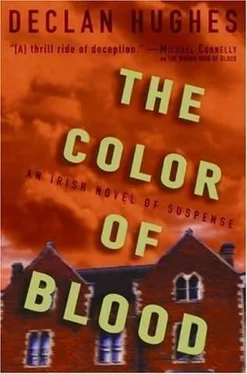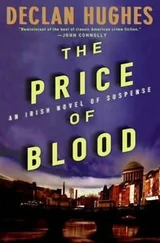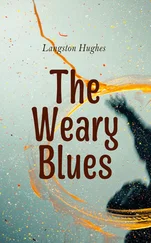“Do you think it’s a bit crass of him, Denis? A bit embarrassing? Do you and the rest of the car-coat brigade up the rugby club find yourselves sniggering into your scotches at the presumption of the fellow?”
Finnegan’s head swiveled around, and his chin jutted forward, like a man in a pub ready for a fight.
“I’m a Northside boy myself, as a matter of fact. O’Connell’s, then a scholarship to Belvedere. I didn’t cycle up the Liffey on a fucking bicycle. I earned every penny.”
The accent had coarsened a little, but only a little; over the years, the polish had worked its way deep into the grain of Denis Finnegan.
“So you and Brock go back, do you? Back to Blessington Street?”
“I came from Wellington Street.”
“Near neighbors then.”
“We weren’t friends.”
“I wouldn’t have thought so. Brock’s initial ideas for bettering himself were a little more short term than yours. But they seem to have worked out. Fitzwilliam Square still more fashionable than Mountjoy.”
“Once again, Mr. Loy, and while it is a continuing pleasure to talk to you, of course, I must ask-”
“It’s interesting, where people came from. And how they get where they’re going. I didn’t exactly start out with a silver spoon either. My father never really made a go of things. But for a while he ran a motor garage, quite near Woodpark. And the funny thing is, he had a fellow there working for him, name of Brian Dalton. Do you know who that was?”
Finnegan’s face was perfectly still.
“I think…and I could be wrong…that he and Brian Taylor are the same,” I said.
“And if they are…?”
“Well, I wonder if it’s interesting. Since a while later he married the Howard family’s heavily pregnant housemaid, and they moved into a house in Woodpark. And then he seems to have disappeared, and she was thought to have drowned herself.”
“And the child?”
“And the child was adopted. So you see, there are connections to be made. It would be extremely interesting to know what his proper name was, Taylor or Dalton. Someone who knew him back in the day should know that, at least. Then again, maybe you’re right, maybe it’s not that interesting at all. Why don’t we talk about property again? It’s still the conversational topic of choice in Dublin, isn’t it? And it’s what you chose to speak to me about when we first met-can it only have been two days ago? It feels like much longer.”
“It certainly does. Can I get you another drink?”
“Here, allow me.”
I took our glasses and the Macallan to the drinks table and, seeing my reflection in the window, checked to see if Finnegan was watching. He was staring into the fire, and it was the work of a moment to snap the top of the GHB bottle, drop a capful and a bit into Finnegan’s glass and replace the bottle in my pocket. As I poured the whisky and added water, I stared out the big sash window. The shutters were open, and I noted again how the windows diminished in size as the floors rose, how this one was smaller than the ground-floor window had been in Fitzwilliam Square. The congruence between Finnegan and Taylor, near neighbors as kids in a rough end of town, now residents of two of the city’s great squares, was setting off flares in my brain. The light from each revealed another stop on the map; I was counting on reaching my destination before the night was out.
“What I’m interested in is the will Shane and Sandra’s mother left. Remember, you were talking about it yesterday? You felt Jessica Howard was going to prove troublesome.”
Finnegan turned and looked at me as if he was surprised I was still here.
“And why should that be of any moment, Mr. Loy?”
“Because it gives several people a motive for wanting her out of the way. As you reminded me, I’m working on behalf of Shane Howard, and if he’s not the only one who might have profited from his wife’s death, well, all the better for him.”
I gave Denis Finnegan his drink and sat down across from him.
“I spoke to the Guards in Seafield about this myself.”
“And what did you say?”
“Mary Howard stipulated in her will that Rowan House was to go to Shane and Shane alone.”
“Yes, but Shane and Sandra were locked in a dispute over what to do about the bequest. Shane told me he wished it had been split.”
“Well, in practical terms, Shane was behaving as if it had been.”
“What does that mean? That he agreed with the plan to build the fourth tower?”
Finnegan looked into his glass and made a face. I took a drink of mine and smiled. He shook his head.
“Did you mix the whisky with mineral water?”
I nodded, and Finnegan clicked his tongue.
“An unforgivable solecism, Mr. Loy. An excess of sodium. Still, a sin to waste it.”
He took a good belt of his drink and sat back.
“I think au fond Shane was on Sandra’s side, yes. I think he favored that option. A center for private psychiatric care. It would be the final piece of the jigsaw. But Shane was caught between Sandra and Jessica’s plan for a residential development. And since Jessica and Shane were about to separate, and presumably to divorce, you might say she was keen to maximize her settlement before she left.”
“Why do you believe Shane would have supported the plan to build the final tower? He sounded at best neutral to me.”
“He knew Sandra wanted it. Shane has always been keen to see Sandra protected, ever since they were children. To make sure she wasn’t hurt. To make sure she got what she wanted. What she deserved.”
Finnegan was beaming at me now, his eyes flickering, the red dome of his brow glowing like exposed flesh. What was he asking me to believe? That Shane Howard had been the one all along, the one to ensure that Dr. Rock was free, that Finnegan was able to step forward, and now, the one to clear Jessica out of their way?
“I’ve tried to make that my job also, as her husband. I don’t know that I can say I’ve succeeded. We effectively live apart now. I know I’ve failed in many respects, although I think I have been a good father-yes, ‘father’ is not too strong a word-to young Jonathan. But I know too that I’ve always given of my best. And I always have been, and remain, loyal to the Howard family, Mr. Loy.”
He sounded like a politician giving a resignation speech. He drained his glass, made his way to the drinks table and poured a large neat whisky.
“And that’s what the fourth tower would be, would it?” I said. “The vindication of the Howards?”
“I don’t think ‘vindication’ is the appropriate word. You might find ‘apotheosis’ excessive.”
“I might. If I was sure just what it meant.”
“Their ascension to Olympus. Their deification. Mock all you like, but when John Howard built the first tower there was no vision in this country, nothing but piety and spite. And he saw beyond that, he saw…he saw the future, Mr. Loy. It’s not fashionable anymore to laud great men, but I’ve seen one in my lifetime, and John Howard was that man. I remember the day I first set eyes on him. It was way back, an under thirteens A game. I played hooker for Belvedere, Shane was the captain of that year’s Castlehill side. It wasn’t much of a game, muddy pitch, kick and ruck, grind out the penalties. Castlehill won, of course, chiefly because of a great piece of opportunist play from young Howard, blind-side break from twenty yards caught us napping, handed off fullback and winger like they were made of straw, only try of the game. And it was a killer, but it was one of those times where you have to go, fair enough, you’ve got it and we don’t. And that’s when I saw John Howard for the first time, tall, elegant, the long coat, the red and green paisley scarf, the black fedora. He cut a dash, you know? He really cut a dash. He looked fitter than any of the boys on the field, and he must have been knocking on seventy by then. Like Peter O’Toole, you know? And the two angel girls with him, my God. Sandra, maybe fourteen, with her hair right down her back, her eyes like jewels, her milky skin…my God, she looked like a princess. Like a real…princess.”
Читать дальше










